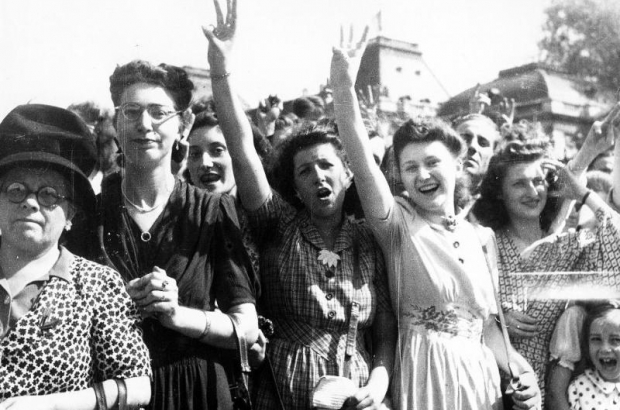- Daily & Weekly newsletters
- Buy & download The Bulletin
- Comment on our articles
Belgium remembers: One family’s recollection of wartime occupation
Belgium is marking the 100th anniversary of its liberation from Nazi occupation during WWII with a year-long calendar of events. On the eve of the 11 November armistice commemoration, Brussels residents Carine and Michèle tell the Bulletin about their family’s wartime experiences. When their grand-father became a prisoner of war, his wife and children had to survive occupation, like many families around the country.
“At the beginning of the war, our grand-father was a captain in the Belgian infantry. From May to June 1940, the German army invaded Belgium and there was a massive exodus of the population. The Belgian army was soon pushed into a small corner, northwest of the country. After their defeat, a large number of Belgian soldiers and civilians escaped to England and formed the Belgian free forces.
Our grand-father, along with other Belgian soldiers, tried to move north and also escape to England. His wife and two children were supposed to follow and join him across the channel. But our grand-father was captured by the Germans and deported to a prisoner of war camp in Germany, like 30% of Belgian land forces in 1940.
He was detained in Rottenburg, in a prisoner of war camps for officers, called an Oflag; conditions were harsh. Rank and file soldiers and NCOs were grouped in other camps, Stalags. While officers could not be put to work, other prisoners were obliged to work in factories.
With her husband in prison, our grandmother had to look after their 11-year-old twin girls on her own. They lived in Brussels and daily life was difficult. Food, fuel and clothing were strictly rationed by the German authorities. Despite the draconian rations, food and other basic necessities were often in short supply. There was an underground black market that supplied food at exorbitant prices for those who could afford it. But our grand-mother received 250 Belgian francs per month to live on for her and her daughters. With her ration coupons, she queued to receive one soft loaf of black bread and porridge, never any fruit and only the occasional vegetable.
There was a curfew every evening in case of bomb attacks and it was imperative to join the nearest bomb shelter. Our aunt remembers one bombardment, when instead of seeking refuge, the three of them wanted to get home as quickly as possible. They had to step over the legs of German soldiers lying on the ground with machine guns in their hands, while bullets echoed around them.
With the arrival of the Allied forces in September and October 1944, Belgium was finally liberated. British, Canadian and American troops, as well as the Piron brigade (independent Belgian force), advanced across the country.
Although the country was free, not all of its imprisoned soldiers were released. Around 65,000 war prisoners remained in captivity, including some 4,000 officers, mainly from Wallonia. Our grand-father was one of them; after five years in prison, he was finally liberated by the Russian army.
On his return to Belgium, he was promoted to Major and continued his career in the army. When our grand-father came home, his daughters, now 16, recognised him, but had forgotten the sound of his voice.
Our mother also recounted meeting and socialising with a group of American pilots before they were killed when their plane crashed.
She spent the rest of her life in Brussels, marrying an army officer who had grown up in the countryside during the war, in the south of Belgium. Conditions were less difficult for him and his brother; they always had something to eat, including fresh eggs and vegetables.
Although she rarely spoke of her teenage years under occupation, it was a period that was to leave an indelible mark on the life of our mother and her family.”
Image: Belgian people celebrating the liberation of Brussels, 7 September 1944/BELGA PHOTO ARCHIVES



















